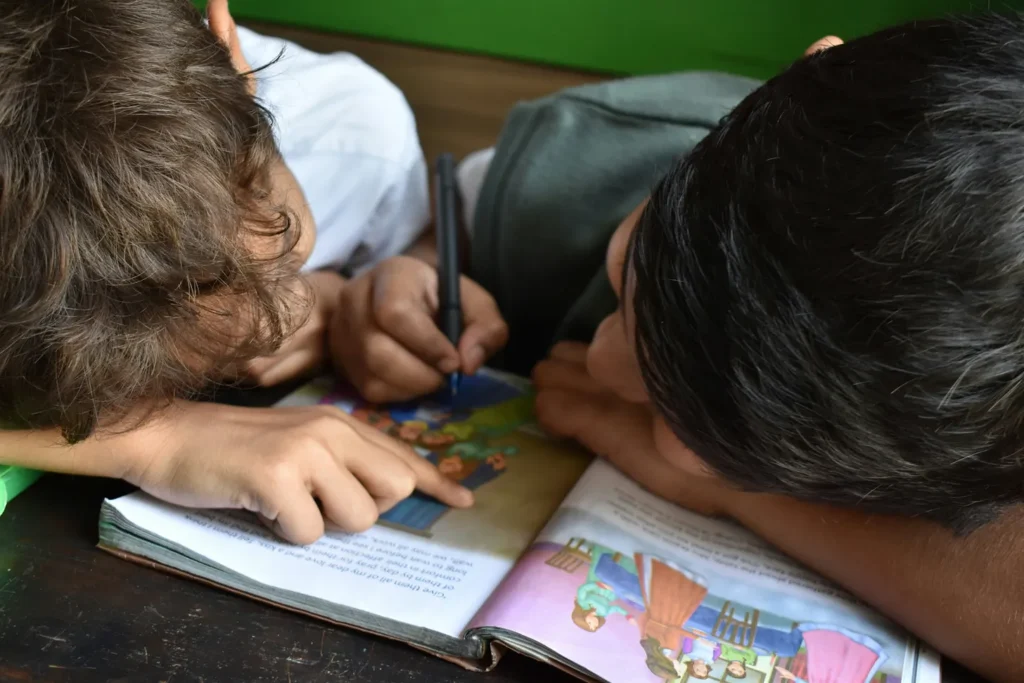I have an older daughter and a younger son – both of whom I taught to read. When I taught my daughter, we sat quietly on the floor exchanging flashcards and speaking calmly. By contrast, a few years later when I taught my son, we used those same flashcards as train tracks and marched around the house, him yelling out the words loudly and me making the train horn sound behind him as we moved. That anecdote resonates with so many parents as we discuss how boys often require different approaches to learning.
When my son entered middle school he was an avid reader and writer. However, we struggled to find any boys’ book clubs or male peers who shared his interest. There were plenty of girls’ book clubs and girls who loved writing stories and poetry. I wondered, during those years, why there wasn’t much emphasis on teaching boys to love the humanities.
In high school, my son often talked to me about the kinds of friendships he made versus the kind of friendships his sister had made. Hers were deeper, focused on feelings and emotion. His friendships tended to focus on playing sports or video games and it took much longer to get below the surface. Often he said it was tough to make “real” friends and he often was left feeling a little bit alone.
Finding a Solution
The impetus for starting my nonprofit in 2024 called Boys Who Write came from these experiences raising my son. His story is not unique. Many boys have trouble forming deep friendships, lack male mentors, and would benefit from more tailored teaching styles. I strongly believe their challenges demonstrate a need for change; all the research clearly validates that boys are disengaged from education and need help supporting their mental health.
When we look globally, boys are less likely than girls to be able to read and comprehend a simple text by the age of 10. In the United States, on our recent national writing exam, only 18 percent of 8th grade boys were considered proficient writers. Boys are two times as likely as girls to be suspended and boys often feel language arts skills are not considered “masculine.”
According to Equimundo’s State of American Men 2025 report, more than half of all men say “no one really knows me.” Young men are four times as likely as women to die from suicide. And 45 percent of young men say they trust violent, misogynistic voices online.
Boys Who Write builds essential communication skills in boys to strengthen their own emotional well-being, build meaningful relationships, and thrive and lead within their communities. We provide male mentorship, develop a love for reading and writing, and teach relationship building.
We re-engage boys in education with a strong, innovative reading and writing curriculum that aligns with their interests. We develop a creative curriculum that integrates video games, music, and other forms of digital engagement. We incorporate social emotional learning within that curriculum to provide authentic, natural opportunities to practice communication skills.
Key elements of our program include:
- A blend of online and in-person teaching
- Social emotional and English language arts learning
- A nationwide male mentorship network to teach the program
Our social emotional curriculum teaches the ability to:
- Recognize, label, and understand emotions
- Apply strategies to manage emotions, cope with stress, and demonstrate resilience
- Communicate emotions and needs clearly, listen actively, and resolve conflicts constructively
- Recognize societal norms, biases, systems of oppression, including gender stereotypes
- Evaluate ethical dilemmas, challenge injustices, and contribute to inclusive communities
This summer we ran a six week pilot program at KIPP Valiant Community Prep, a school in the San Francisco Bay Area. I was fortunate to be in the classroom every single day and observe how students reacted to our curriculum. Guided by the theme “The Power We Take, and the Power We Give,” boys explored big questions about identity, leadership, and masculinity through conversations and projects. After six weeks of hard work, exploration, and meaningful self discovery, the boys walked away with:
- Strong narrative and poetic writing skills
- The ability to apply literacy in multi-modal contexts
- Greater social emotional awareness and collaboration
- Increased engagement and enthusiasm to read and write
One 12-year-old boy walked into the first few classes very disengaged. He wore a hoodie that remained on his head throughout class and when asked a question, he put his head facedown on his desk and refused to answer. In his pre-assessment, he answered most questions with a one word answer or “idk.” By the end of the six weeks, that same child walked into class enthusiastically, often engaged and led discussions, and in his post assessment, wrote paragraphs. His behavior was typical of most of the boys in the class. On the last day of class, one student said, “The only thing that got me through the summer was getting up in the morning for Boys Who Write.” All of the students, by the end, called themselves “the OG Boys Who Write.”
Equimundo and Boys Who Write have a shared mission to expand our views and depictions of boyhood and masculinity. We both believe in expanding rigid models of masculinity to include expression and communication. Our organization complements the work of Equimundo’s Global Boyhood Initiative by meeting boys where they are, demonstrating the power of writing, and providing opportunities to communicate through authentic projects and collaboration.
Boys have incredible humanity and capacity to communicate. It is the practice of demonstrating those skills that we want boys to further develop. Together we can help boys find their voice and express that humanity.
